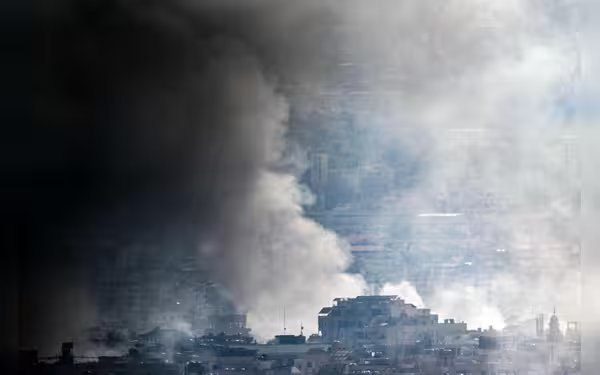Saturday, November 16, 2024 05:31 PM
Escalating Violence in Lebanon: 11 Killed, 108 Injured in Israeli Airstrikes
- 11 killed and 108 injured in recent airstrikes
- 720 deaths reported in the past week
- 118,000 people displaced due to ongoing conflict
 Image Credits: arabnewspk
Image Credits: arabnewspkIsraeli airstrikes in Lebanon result in 11 deaths and 108 injuries, escalating the humanitarian crisis amid ongoing conflict.
In recent days, the conflict between Israel and Hezbollah has escalated dramatically, leading to significant casualties and destruction in Lebanon. The situation has become increasingly dire, with reports indicating that at least 11 people were killed and 108 injured in Israeli airstrikes on Friday alone. This surge in violence comes amid ongoing military operations that have shifted focus from Gaza to Lebanon, raising concerns about the humanitarian impact on civilians caught in the crossfire.
On Saturday, a new Israeli strike targeted a building in the southern suburbs of Beirut, a stronghold for Hezbollah. According to a Lebanese security official, the attack struck the second and third floors of the building, further intensifying fears among residents. The Israeli military had previously claimed to have killed Hezbollah leader Hassan Nasrallah, although this has not been confirmed by the group itself.
The bombardment has not only affected Hezbollah's traditional strongholds in southern and eastern Lebanon but has also extended to areas outside these regions, including the Keserwan area north of Beirut. The Lebanese Health Ministry reported that the ongoing airstrikes have resulted in the deaths of at least 720 individuals over the past week, highlighting the severe toll this conflict is taking on the population.
As the violence continues, the Israeli military has conducted over 140 airstrikes in southern Beirut and the Bekaa Valley, targeting facilities believed to be storing anti-ship missiles. These strikes have led to widespread destruction, with many civilians forced to flee their homes. In the southern suburbs of Beirut, the streets are eerily quiet, filled with smoke from the overnight bombardments. Shelters for displaced individuals are overflowing, and many families are left to sleep in public squares, on beaches, or in their cars.
The humanitarian crisis is deepening, with around 118,000 people displaced due to the ongoing conflict. The sight of families making their way to the mountains, carrying their infants and whatever belongings they can manage, paints a heartbreaking picture of the desperation faced by many. The situation remains fluid, and the international community watches closely as the conflict unfolds.
The recent escalation of violence in Lebanon serves as a stark reminder of the human cost of war. As the conflict continues, it is crucial for the global community to advocate for peace and support humanitarian efforts to assist those affected by the ongoing hostilities. The resilience of the Lebanese people in the face of such adversity is commendable, but the need for a lasting resolution to this conflict has never been more urgent.













